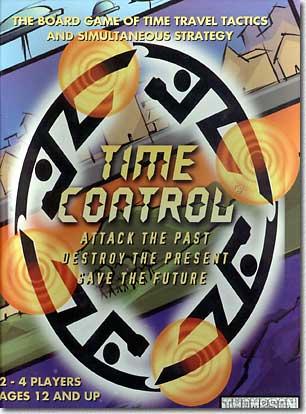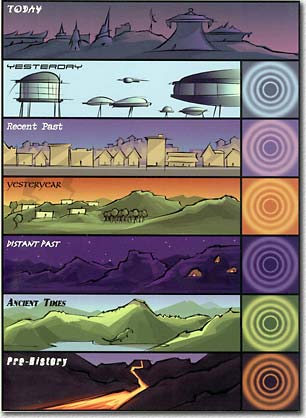
“Time Control” has been one of the most dissed games in boardgamegeek history – this has to do with the fact that the designer sent out many free games to possible reviewers, a practice which is normally laudable but which backfired in this case. We as the “Westpark Gamers” had also received a copy, but as it arrived relatively late we already had word from the various boardgamegeek reviews (by usually reliable reviewers) that this game was truly awful. Therefore we never really got around to play it (or rather didn’t dare, to be honest).
This reviewer will not try to rectify the view that is dominant about “Time Control” – the game suffers from many flaws and has certainly not been playtested enough (or perhaps not at all). But while reading the rules (second, optimized version, still with many unclarities) I found that some of the ideas in the game were neat and interesting. I also felt sorry for the game designer, who had apparently gone to great length to present and print his game professionally (you can certainly not say that the game is ugly looking, although tastes differ). Also, I am a fan of the “time machine” genre, of which there are only very few good games (and only one true masterpiece, the totally underrated and out of print “Time Agent” by TimJim games). So before we finally decided to test this game, I already changed some of the rules that I was sure wouldn’t work (therefore sparing us the aggravation that the other testers felt while trying “to make it work”). But more about that later...
To give you some idea what the game is about, here is a short description:
Each player represents a time agency which tries to keep reality safe from “time waves”, accumulated problems that wander “up” to the present from the past, created by the other players agents. Each player therefore is master of his own “alternate reality”.
There are 7 time zones: today, yesterday, recent past, yesteryear, distant past, ancient times and pre-history. Today is where your agents are safe, and from which you send them to the past, to your own, and ultimately also to other players time zones. There are 4 kinds of agents: normal ones, brawlers (good at beating the crap out of other agents), scientists and historians (which are good in influencing and changing the time waves).
First players deploy their agents on various time zones on their own board (movement is linear, you can only move towards pre-history, from which you “snap back” to the present). Now the most problematic phase of the game begins: the “free for all”, which simply doesn’t work. In the original rules every player can do whatever he wants whenever he wants, he just has to announce it, and see if somebody opposes it. The latter happens when another player tries to take “time control” , saying “before you do this I do that”, to which of course another player can chime in say “and before you do that, I do this”, etc. ad nauseam. At some point you try to get out of this mess by resolving these “time duels”, which are akwardly done by the rules: you either spend time chips (numbered 1-21) OR you play a “Fate” time chip which enables you to blindly draw a card from -15 to +15 (or an automatic win card – sic!). Confused already? Even more confusing is the fact that you can always re-duel (in fact every player involved in the duel could do that), and that you lose only the highest time chip spent, the others are kept.
Theoretically every player can be active until all his agents are “busy”, moving/activating one at a time. Agents are moved to other boards to create “create” tokens, which in turn create a time wave that after the first round moves up to the present step-by-step to create more “create tokens” and finally problem cards, which oust a player from the game if he accumulates enough of them. Agents can also try to rectify these problems by flipping the create tokens to their “solve” side (when in the same zone) - “solve” tokens who reach the present can get rid of “problems”. Of course you can also attack other agents, again using the clumsy duel rules.

And have I already said that time waves also attack agents, again using the duel rules??? Although the duel faintly reminds one of the classic “Cosmic Encounter”, it is absolutely overdone to use it for nearly every mechanism in the game – in “Cosmic” playing the duel cards is always decisive and much more rarely done.
And the biggest problem is: The first turn never ends! Agents keep on being active (you start with 12), as some actions, even sometimes fights, don’t “busy” them, therefore ending their activities. This means that we look at at least 48 if not more actions by four players, most of which will be duelled about. And most of which will involve yet another duel! And reduelled. And reduelled again. For all eternity (perhaps fitting the theme, perversely).
All play reports said the same: They were playing the first round for what seemed like ages, and then stopped because they simply were bored witless.
All this doesn’t sound like a lot of fun. This is why I tried to change it!
When we finally played I already used the optional rules that I created, and lo and behold, suddenly the game wasn’t half bad! Players even admitted having “fun”! :-)
After experimenting a bit more this is my attempt at an easy rules fix that makes “Time Control” a much better, perhaps even interesting game. I am actually sure that the designer, who I applaud for being calm about all the bad reviews, would have changed the rules to this had he tried out the game a bit more with neutral playtesters. Everybody at our playing agreed that this game “deserved another chance” – I leave it to you if you are willing to give it a try!
Main problems with the game:
And here is my attempt at a fix:
SETUP
GAME PLAY
One major change: At the beginning of the game there is a time duel, using the time control tokens. If there is a tie between two players, these two duel again, but they cannot use the tokens they already played. The highest bidding player becomes “player 1”, the second highest “player 2” etc.. Tokens that are played are lost, even if several were played.
Now the playing order for the game has been established, which is adhered to strictly, until somebody opposes it (see below).
Playing “interrupts”: Every player does one action at a time, as per the original rules. But before he actually puts the action into effect every player can “interrupt” his action, and try to duel for “time control”. The first player to announce this challenge plays a duel with the challenged player, using the “time control” tokens. The higher value wins, ties are repeated like above. If the challenging player wins, he now takes over the former position of the challenged player. He now does one action of his choice, which cannot be interrupted again by other players! If the challenged player wins, he proceeds to do his original action (which cannot again be interrupted by other players).
Example: Player 1 announces and does an action. Then player 2 announces another action. Player 1 wants to interrupt and is the first to do so. Both players play a time duel. Player 1 wins and now becomes in effect player 2, giving him two actions in a row, while player 1 misses a turn. When it is player 3’s turn, either player 1 or player 2 (or player 4) could interrupt again, therefore changing the turn order again.
All Time Control tokens used for duels are lost and can only be regained through the “Cash in” rules of the original rules, which remain as written!
The will never be any “reduels” – the first duel counts!
FIGHTS BETWEEN AGENTS
Agent’s duels are simplified as thus: Every player simply rolls a 6-sided die, trying to beat the other player’s roll, ties are won by the attacker. The losing player draws a fate card to see the combat result (as in the original rules), which also refers to the attacker (again, as in the original rules).
All other agents by one of the fighting player’s which are in the exact same time zone, add +1 per active agent, even if already busied. These “helping” agents will NOT be busied after the combat!
This modifier is optional, the player can choose to involve only a few, even none of his other agents (he has to specify which). But all agents who were involved in a combat suffer the same negative result when losing (not when winning – so already busied agents won’t suddenly become active again!).
“Sabotage” and “Aid”:
TIME WAVE ATTACKS
These attacks are handled as combats above, but there is no “aid” this time. Time waves roll 1 die, adding 1 for each token present above one, regardless of it’s kind (for example: the time wave consists of 3 “create”’s and 1 “solve” – it rolls 1 die, adding 3 to the result.
Defending agents roll a die at a time for each of their agents present, adding 2 if the agent is still active, and nothing if the agent is busied.
Results of successful time wave attacks are handled by drawing a fate card, as in the original rules.
WINNING CONDITIONS
Players are never kicked out of the game. Instead they accumulate “problem” points for problem cards drawn. These problem points are kept, even if the problem card is later “solved” (use poker chips or write them down).
You get:
The first player to accumulate 10 problem points ends the game immediately. Now the player with the fewest problem points wins the game. If there is a tie, add all remaining time control tokens of the players involved, checking who has more. If there is still a tie, count the agents of the players involved, checking who has the most left. If there is still a tie, both (or more) players win!
All other rules are as in the original game.
Note: These rules are still a work in progress. I would be interested in how you liked them, and if you have other suggestions. In our opinion they made for a quicker, more interesting game, that brings out the qualities of the original design idea much more than the original rules.
| view/add comments |
ATTACK THE PAST
DESTROY THE PRESENT
SAVE THE FUTURE!
©Westpark Gamers, 2003, Moritz Eggert